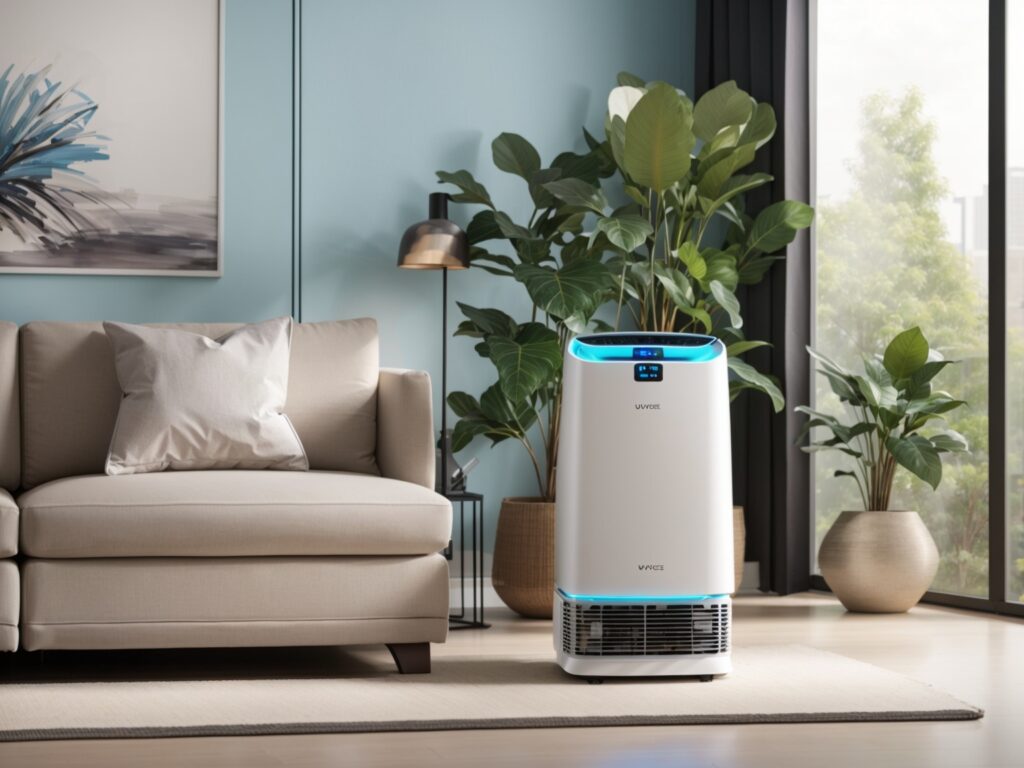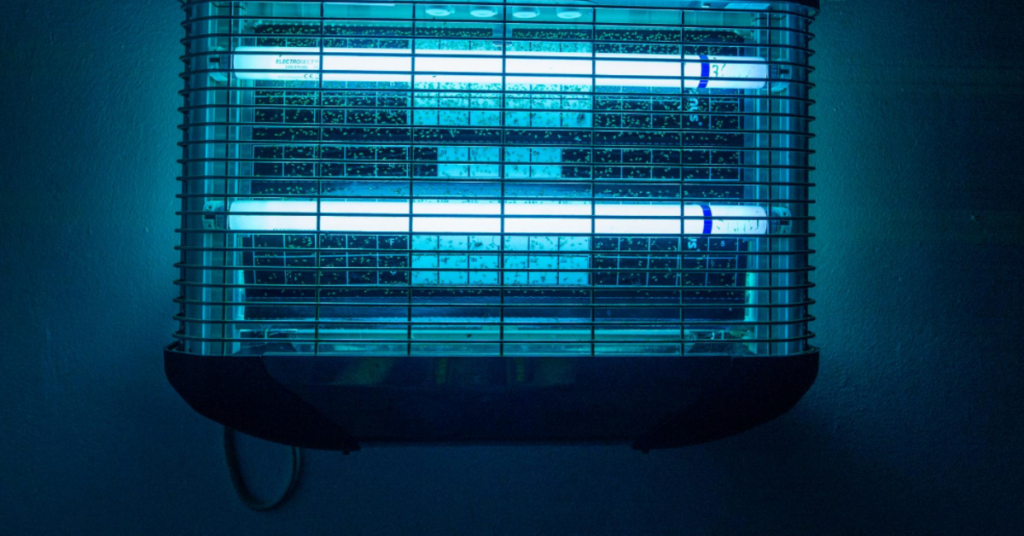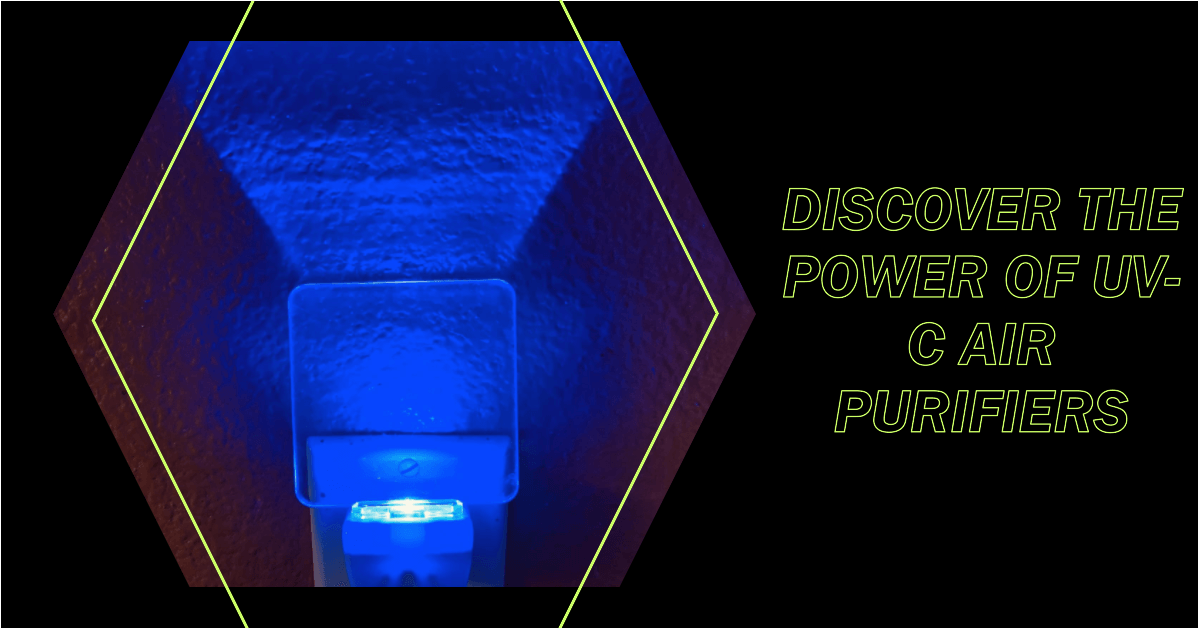UVC air purifiers use UV-C technology, which is helping us by creating healthier indoor environments, let’s start by unraveling its fundamentals. UV-C light or ultraviolet C, is a powerful tool in the world of air purification. It’s harnessed for its ability to neutralize harmful microorganisms lurking in the air we breathe. This technology is at the heart of UVC air purifiers, contributing to fresher, cleaner indoor spaces.
What Is UV-C Technology?
UV-C, which stands for ultraviolet C, might sound complex, but its purpose is rather simple: to make the air we breathe cleaner. UV-C is a type of ultraviolet light, and it’s widely used for disinfection and purification. Its power lies in its ability to destroy microorganisms that lurk in the air, making it a potent ally in our pursuit of healthier indoor spaces.
UVC means for “Ultraviolet-C.” “C” in “Ultraviolet-C” (UVC) refers to a specific range of ultraviolet (UV) light within the UV spectrum. It is a specific type of ultraviolet (UV) light with a wavelength range of 200 to 280 nanometers (nm). UVC light is known for its germicidal properties, as it can effectively kill or inactivate microorganisms like bacteria, viruses, and fungi.
How UV-C Works?
At its core, UV-C technology operates by attacking the genetic material (DNA or RNA) of microorganisms, rendering them harmless. When UV-C light is directed at these tiny invaders, it penetrates their cells and disrupts their DNA. This disruption prevents them from reproducing and effectively neutralizes their ability to cause harm.

UVC Air Purifiers
Let’s explore how it fits into the world of air purifiers.
Integration in Air Purifiers
Air purifiers are designed to clean the air in our homes, removing particles and pollutants that can affect our health. UV-C technology finds its place in these devices as an additional layer of defense. When combined with other filtration methods like HEPA filters or activated carbon, UV-C technology becomes a powerful force against airborne contaminants.
Benefits
The real superpower of UV-C air purifiers is its ability to neutralize harmful microorganisms, including viruses. In a time when we’re acutely aware of the importance of virus protection, UVC air purifiers have gained prominence. They’re particularly effective against viruses like the flu and even the notorious COVID-19.
UV-C vs. Other Filtration Technologies
HEPA Filters
While UV-C technology focuses on microorganisms, HEPA filters are experts at capturing particles like dust, pollen, and pet dander. HEPA stands for High Efficiency Particulate Air, and these filters can trap tiny particles as small as 0.3 microns. Combining UV-C and HEPA filtration provides a comprehensive approach to air purification, addressing both microorganisms and particles.
Ionic Filters
Ionic filters, also known as electronic or ionizer air purifiers, work by emitting charged ions that attach to particles and make them heavy. These heavy particles then fall to the ground or are caught by a collector plate within the purifier. While ionic filters can be effective, they primarily target particles rather than microorganisms, making UV-C technology a valuable addition for comprehensive air cleaning.
UV-C Technology: Safety and Maintenance
As we explore the world of UV-C technology and its role in air purification, it’s important to address safety concerns and understand how to maintain its effectiveness.
UV-C Safety Measures
While UV-C is a powerful tool against microorganisms, it’s essential to use it safely to avoid harm to humans and pets.
Direct exposure to UV-C light can be harmful to our skin and eyes. It’s crucial to ensure that UV-C bulbs within air purifiers are well-contained and shielded, preventing any accidental contact with the light source. Most UV-C air purifiers are designed with safety in mind, but it’s still wise to exercise caution when handling or servicing them.
When operating UV-C air purifiers in your home, ensure that people and pets are not in the immediate vicinity during operation. Most UV-C air purifiers include safety features that turn off the UV-C light when someone approaches, but it’s best to adhere to manufacturer guidelines for safe usage.
Maintenance
To maintain the effectiveness of UVC air purifiers, regular maintenance is essential.
UV-C bulbs have a lifespan, and their germ-killing capabilities diminish over time. UV-C bulb replacement is essential as their germ-killing capabilities diminish over time. Refer to your air purifier’s manual for guidance on how often you should replace the UV-C bulbs. Regular replacement ensures that the device continues to perform at its best.
Keep the inside of your air purifier clean, especially the surfaces around the UV-C bulbs. Dust and dirt can reduce the effectiveness of the UV-C light. Regularly vacuum or wipe down the interior components as recommended by the manufacturer.

Choosing the Right UVC air purifiers
When it comes to selecting the right air purifier with UV-C technology, several considerations can help you make an informed choice.
1. Room Size: Begin by determining the size of the room where you plan to use the air purifier. Different models are designed for varying room sizes, so choosing one that’s appropriate for your space ensures maximum effectiveness.
2. Features: Explore the features offered by different models. Some UV-C air purifiers come with advanced controls, multiple fan speeds, and filter replacement indicators. Consider which features align with your needs and preferences.
3. Budget: Set a budget that aligns with your requirements. Air purifiers with UV-C technology are available at various price points, so it’s essential to explore options within your budget range.
Product Recommendations
To simplify your search for a UV-C air purifiers, here are a few reputable UV-C product recommendations models to consider:
- GermGuardian AC4825: This compact unit combines HEPA filtration with UV-C technology to effectively capture particles and kill airborne germs. It’s suitable for smaller rooms and is known for its reliability.
- Honeywell HPA300: Designed for larger rooms, this air purifier offers a robust three-stage filtration system, including UV-C technology. It’s ideal for those seeking comprehensive air purification in spacious living areas.
- Levoit LV-H132: If you’re looking for a budget-friendly option with UV-C technology, the Levoit LV-H132 is a solid choice. It’s compact and well-suited for smaller spaces, making it an excellent addition to bedrooms or offices.
Harnessing UV-C Technology for Your Home
Now that we’ve delved into the mechanics and importance of UV-C technology, it’s time to explore how you can make it a part of your home environment. The versatile applications of UVC light for home use extend beyond air purifiers, providing additional ways to ensure a healthier living space.
UVC Light for Home Use
One of the most exciting developments is the availability of portable far UVC light devices for personal use. These handheld gadgets are designed to bring the power of UV-C technology into your daily life. With a handheld UVC light, you can target high-touch surfaces, gadgets, and personal items, effectively disinfecting them and reducing the risk of illness transmission.
UV-C Ceiling Lights and Upper Air Units
For broader coverage, consider installing UVC ceiling lights or UVC upper air units in your home. These systems use UVC germicidal light to continuously disinfect the air in enclosed spaces. They are particularly useful in shared living areas, offices, or classrooms, where maintaining air quality is essential.
Choosing the Right UV-C Solution
As you embark on the journey of incorporating UV-C technology into your home, it’s crucial to make informed choices. Selecting the right UVC light for home use or additional UV-C sanitizing light systems requires careful consideration.
Product Recommendations
To assist you in making the right choice, here are some UV-C product recommendations tailored for home use:
- Handheld UVC Light: Consider devices for personal disinfection needs. These compact gadgets offer convenience and peace of mind.
- UVC Ceiling Lights: For broader coverage in shared spaces, explore options UV-C ceiling lights or similar upper air units.
- UV-C Germicidal Lamps: These are versatile and can be used in various settings. Different Brands offer reliable solutions.
The Future of UV-C Technology
As we continue to embrace the potential of UV-C technology in our homes, it’s also important to look toward the future. The ongoing development and research in this field hold promise for even more effective and accessible applications.
Advanced UV-C Innovations
Researchers are constantly working to refine UV-C light sources, making them more energy-efficient and accessible to the general public. This means that in the coming years, we can expect more user-friendly and cost-effective UV-C sterilizing light options for home use.
Integration with Smart Homes
With the rise of smart home technology, it’s conceivable that UV-C ceiling lights and other devices will become seamlessly integrated into our daily routines. Imagine a future where your home’s air quality is monitored and managed automatically, with UV-C technology playing a central role in maintaining a clean and healthy environment.
Conclusion
As we wrap up our deep dive into UV-C technology, we’ve uncovered its remarkable ability to neutralize harmful microorganisms in the air, making our indoor environments safer and healthier. By combining UV-C with other filtration methods, you can achieve comprehensive air purification that addresses both microorganisms and particles.
When considering UV-C air purifiers, remember to prioritize safety, adhere to maintenance recommendations, and choose the right unit for your space and needs. This way, you’ll be well on your way to enjoying cleaner, fresher indoor air and a healthier living environment.
Frequently Asked Questions (FAQs)
Is UV-C Safe in Air Purifiers?
UV-C technology in air purifiers is generally safe when used correctly. UV-C light is confined within the purifier and does not emit harmful radiation into your living space. However, it’s crucial to follow the manufacturer’s safety guidelines to prevent any accidental exposure to UV-C light, which can be harmful to your skin and eyes.
Which is Better: UV-C or HEPA Filter?
The choice between UV-C and a HEPA filter depends on your specific needs. HEPA filters are excellent at capturing tiny particles like dust, pollen, and pet dander. UV-C technology, on the other hand, specializes in killing germs, including bacteria and viruses. Often, the best approach is to use both technologies together, as they complement each other for comprehensive air purification.
What is UV-C Mode on Air Purifier?
UV-C mode on an air purifier refers to the setting where the device activates its UV-C light to target and eliminate airborne germs. This mode can usually be controlled and turned on or off based on your preferences and the need for germ disinfection.
What are the Benefits of UV-C Air Purifiers?
UV-C air purifiers offer several advantages:
They effectively kill a wide range of harmful microorganisms, including viruses and bacteria.
They enhance the overall cleanliness of indoor air by reducing the presence of germs.
They are particularly beneficial in spaces where airborne pathogens may pose health risks.
What are the Disadvantages of UV-C Light?
While UV-C technology is effective at killing germs, it has limitations:
It doesn’t remove physical particles like dust or allergens from the air.
UV-C light must be used in conjunction with other filtration methods for comprehensive air cleaning.
Direct exposure to UV-C light can be harmful to humans and pets, so safety precautions are essential.
What is the Risk of UV-C?
The primary risk associated with UV-C technology is direct exposure to UV-C light. It can harm your eyes and skin, similar to the effects of sunburn. To mitigate this risk, UV-C devices are designed with safety features, and it’s crucial to follow safety guidelines when handling or operating them.
Is UV-C Worth It?
Whether UV-C technology is worth it depends on your specific needs and concerns. If you want additional protection against germs, especially during flu seasons or health crises, UV-C can be a valuable addition to your air purifier. However, it’s most effective when used alongside other filters like HEPA for a more comprehensive approach to air purification.
What Filter is Better Than HEPA?
ULPA (Ultra Low Penetration Air) filters are considered more efficient than HEPA filters at capturing smaller particles. ULPA filters can remove particles as small as 0.1 microns, making them suitable for environments where extremely high air purity is required. However, they are less common and may come at a higher cost.
Are UV Filters Healthy?
UV filters, when used properly and safely, are healthy for indoor air quality because they can help eliminate harmful microorganisms. However, it’s essential to follow safety guidelines to prevent any potential health risks associated with UV-C light exposure.
What is the Best Mode for Air Purifier?
The best mode for an air purifier depends on your specific needs and the air quality in your environment. Common modes include fan speed adjustment, sleep mode for quieter operation at night, and, in some cases, a UV-C mode for germ disinfection. The best mode will vary from one situation to another and should be chosen based on your priorities for air quality improvement.
How safe is UV-C technology in air purifiers?
UV-C technology is safe when used correctly and following safety guidelines. It’s designed to be contained within the air purifier, preventing direct exposure to humans and pets.
How often should UV-C bulbs be replaced in air purifiers?
The frequency of UV-C bulb replacement varies by model. Consult your air purifier’s manual for specific recommendations. In general, they may need replacement every 6-12 months.
Can UV-C technology in air purifiers remove allergens like pollen and pet dander?
UV-C technology primarily targets microorganisms. For allergen removal, consider air purifiers with HEPA filters, which are effective at capturing particles like pollen and pet dander.
Are UV-C air purifiers effective against viruses like COVID-19?
UV-C technology has been shown to be effective against many viruses, including coronaviruses. However, its effectiveness depends on factors like exposure time and proximity to the UV-C light source.
Can I use UV-C air purifiers in bedrooms or living rooms with people present?
While UV-C air purifiers often have safety features, it’s recommended to operate them in unoccupied rooms or during times when people and pets are not in close proximity to the device.
DheerajSonwane is a dedicated writer with expertise in air purification technologies. He focuses on providing well-researched content to help readers improve indoor air quality in homes and businesses. As the lead writer at AirPurifierMaster.com, Dheeraj offers practical advice his insightful reviews guide individuals in choosing the best air purifiers for their needs.


6 thoughts on “UVC Air Purifiers : A comprehensive guide on UV-C”